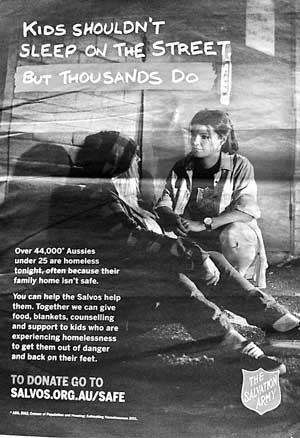Thursday Feb 19, 2026
Thursday Feb 19, 2026
Saturday, 29 October 2016 00:01 - - {{hitsCtrl.values.hits}}
 I was quite surprised when I spotted a newspaper advertisement which highlighted that thousands of kids in Australia sleep on the street every night. It said over 44,000 under 25s are homeless, often because their family home is not safe. A developed country to have such large numbers out of home, I wondered.
I was quite surprised when I spotted a newspaper advertisement which highlighted that thousands of kids in Australia sleep on the street every night. It said over 44,000 under 25s are homeless, often because their family home is not safe. A developed country to have such large numbers out of home, I wondered.
Exploring facts and figures, the numbers experiencing homelessness every night in Australia are over 105,000. It has also been found that homelessness is increasing. In addition, many more live in what is termed ‘insecure housing’, one step away from being homeless.
Surveys have revealed that the majority are rendered homeless due to financial and emotional hardship. Domestic and family violence has been identified as the main cause of homelessness. Those affected by such violence to render them homeless is estimated at 25%. Financial difficulties come next affecting 15%. Other reasons include housing stress (13%), inappropriate or inadequate dwellings (10%), relationship and family breakdown, and housing affordability stress.
The common perception of a homeless person is an older man with a drinking or drug problem who sleeps in an inner-city park or street. However, Census figures as well as surveys show that there is no “typical” homeless person. It has been revealed that homelessness can affect men, women and children from a wide range of backgrounds living in cities, suburbs and country towns. Melbourne, Sydney, Brisbane and Perth have been identified as the key large cities where the problem is acute.
There is yet another category known as ‘hidden homeless’ referring to those who move from place to place. These people move between the homes of family members or, as is often the case with young people who ‘couch surf’, a series of friends. Some stay in refuges, boarding houses, cheap motels, caravans and even cars. It has been found that such uncertainty can take an enormous toll on a person’s self-worth and capacity to go to school, find work and stay healthy.
A Homelessness Week is held once a year – in August when non-profit organisations plan numerous activities to create awareness of the need for everyone to gather and help those who are homeless. Among such organisations are ‘Homeless Counts’, Mission Australia and the Salvation Army. One simple example of lending a helping hand is to provide food, blankets, counselling and support to kids, as the advertisement states.
Mission Australia says that from their experience, people can become homeless after many years of experiencing poverty, poor  relationships and drug, alcohol or mental health issues. “Homelessness can be the result of many social, economic and health-related factors. Sometimes it affects people who have been managing well in life, but are thrown off course by a stressful episode like a relationship break-up, job loss or death of a loved one. This can set off a chain of events that leads to a person being without a place to live,” they point out.
relationships and drug, alcohol or mental health issues. “Homelessness can be the result of many social, economic and health-related factors. Sometimes it affects people who have been managing well in life, but are thrown off course by a stressful episode like a relationship break-up, job loss or death of a loved one. This can set off a chain of events that leads to a person being without a place to live,” they point out.
Helping people to get on top of day-to-day issues – not just while they are in crisis but throughout their lives – goes a long way towards breaking the cycle of homelessness, they stress.
Mission Australia provides life skills and tenancy training, skills such as cooking, grocery shopping and cleaning, so they can maintain their homes and their health, as well as other support as required, to help people vulnerable to homelessness to maintain their leases. The staff works with people experiencing alcohol and drug problems, mental health issues or gambling addictions – factors that can affect their ability to hold a lease.
It has also been found that learning basic money management skills early in life can help people to gain control over their finances and housing situation as adults. Financial counselling and education programmes are offered to help people work out household budgets, shop around for the best deals and gain a better understanding of how to pay bills and save for the future. Learning basic money management can make the critical difference between staying housed and becoming homeless.
It has been accepted that prevention is vital since homelessness comes at a high social and economic cost to the society.